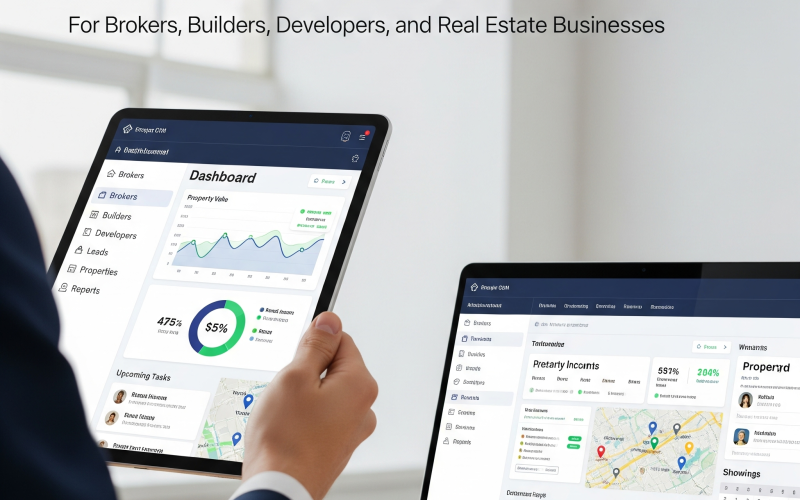Introduction
The real estate industry is evolving at a rapid pace. With rising client expectations, growing competition, and the need for efficiency, businesses can no longer rely solely on traditional methods like spreadsheets, manual paperwork, or endless phone calls. Brokers, builders, developers, and real estate agencies need tools that help them manage properties, nurture client relationships, and streamline operations all from a single platform.
This is exactly where a Smart Property Management CRM proves to be a game-changer. By bringing together client communication, property listings, financial management, and team collaboration into one centralized system, it helps real estate businesses work faster, smarter, and more profitably.
Why Property Management CRM Is Essential in Real Estate
Managing properties is not just about buying and selling; it involves multiple interconnected tasks such as:
- Recording property details and documents
- Handling client inquiries and tenant requests
- Collecting rent and tracking payments
- Marketing available properties to potential buyers or tenants
- Ensuring contracts and legal compliance are up to date
- Generating financial reports for better decision making
Doing all of this manually is not only time-consuming but also increases the chances of mistakes, delays, and miscommunication. A Property Management CRM centralizes these functions, reducing manual work and creating a structured process that is easy to follow.
Benefits of Property Management CRM for Different Segments
1. For Real Estate Brokers
Brokers act as the link between buyers and sellers. Their success depends on how well they manage inquiries, follow up with clients, and close deals. With a CRM, brokers can:
- Store and organize buyer and seller information in one place
- Track the status of property deals through visual pipelines
- Automate reminders for calls, meetings, and follow-ups
- Send bulk emails or SMS updates about new property listings
- Generate reports on deals closed, revenue earned, and client engagement
Impact: Brokers spend less time searching for information and more time closing deals, leading to higher productivity and customer trust.
2. For Builders
Builders often manage large projects with multiple units, buyers, and timelines. A CRM makes their work easier by:
- Centralizing buyer inquiries for different projects
- Managing installment-based payment schedules
- Providing project updates to clients through automated messages
- Tracking the availability and sales status of units in real-time
- Offering insights into which projects are generating the most interest
Impact: Builders can improve sales efficiency, reduce payment delays, and deliver a better customer experience.
3. For Developers
Real estate developers usually manage multiple large-scale projects, often with investors, agents, and clients involved simultaneously. A CRM supports developers by:
- Monitoring progress of each project in one dashboard
- Keeping investor and buyer communication transparent
- Running marketing campaigns targeted at specific buyer groups
- Automating document management, such as agreements and legal papers
- Providing detailed financial reports for better planning and budgeting
Impact: Developers gain complete visibility into their operations, ensuring projects stay on schedule while maintaining profitability.
4. For Real Estate Agencies and Property Managers
Agencies and management firms deal with both property owners and tenants. A CRM system simplifies their work by:
- Automating rent collection with digital payment gateways
- Offering tenant portals for easy communication and service requests
- Tracking maintenance schedules and ensuring timely repairs
- Managing multiple landlords, tenants, and properties seamlessly
- Generating monthly, quarterly, or yearly performance reports
Impact: Agencies reduce manual administrative tasks, keep tenants happy, and maintain stronger relationships with property owners.
Key Features of a Smart Property Management CRM
A powerful CRM doesn’t just store data it adds real value through automation, analytics, and scalability. Here are some of the most useful features:
1. Centralized Data Management
- Store all tenant, buyer, seller, and property records in a secure database.
- Eliminate the need for multiple spreadsheets and disconnected files.
2. Automated Rent and Payment Collection
- Send reminders for rent and installment payments.
- Provide tenants with easy digital payment options.
- Reduce late payments and manual follow-ups.
3. Tenant and Client Portals
- Allow tenants to log in for payment history, maintenance requests, or updates.
- Clients can check project status, documents, and communications anytime.
4. Property Listings and Marketing Tools
- Create detailed property listings with photos, descriptions, and pricing.
- Share directly to websites, social media, or property portals.
- Track performance of marketing campaigns in real time.
5. Maintenance and Service Tracking
- Log requests from tenants instantly.
- Assign tasks to vendors or service teams.
- Monitor status to ensure issues are resolved quickly.
6. Legal and Compliance Management
- Store contracts, agreements, and important documents safely.
- Set automated reminders for renewals, safety checks, and inspections.
7. Reporting and Analytics
- Generate reports on sales, rent collection, occupancy, and revenue.
- Use insights to make better decisions and plan future strategies.
8. Scalability
- Handle business growth without losing efficiency.
- Whether managing 10 properties or 1000+, the CRM adjusts to business needs.
Real-World Use Cases of Property Management CRM
- A broker can receive a lead from a website form, automatically assign it in the CRM, and get reminders to follow up until the deal closes.
- A builder can update buyers about construction milestones via automated SMS/email campaigns.
- A developer can run multiple marketing campaigns for different projects and track which ones perform best.
- An agency can manage tenant rent payments automatically while also tracking property maintenance requests.
How Property Management CRM Improves Customer Experience
At the heart of every real estate business is the customer. Happy clients and tenants are more likely to return, renew contracts, or refer others. A CRM helps by:
- Making communication faster and more transparent
- Providing a self-service portal for tenants and clients
- Ensuring payments and services are handled without delays
- Giving clients real-time updates about their projects or properties
Result: Stronger trust, higher retention rates, and positive word-of-mouth marketing.
Future of Property Management with CRM
The future of real estate CRM systems is moving toward even greater automation and intelligence. Trends include:
- AI-driven lead scoring to identify high-potential buyers
- Chatbots and virtual assistants for 24/7 client communication
- Mobile-first CRM platforms to manage everything on the go
- Integration with IoT devices for smart property monitoring
- Data-driven insights to forecast market demand and pricing trends
Businesses that adopt modern CRM solutions will not only operate more efficiently but will also stay ahead of competitors in an increasingly digital marketplace.
Final Thoughts
Whether you are a broker juggling multiple clients, a builder managing projects, a developer overseeing large-scale investments, or an agency handling properties and tenants, a Smart Property Management CRM is no longer optional it’s essential.
By centralizing operations, automating repetitive tasks, and improving communication, it empowers real estate professionals to save time, reduce costs, and grow their businesses with confidence.
As the industry becomes more competitive, those who adopt technology-driven solutions will be better positioned to build trust, deliver exceptional customer experiences, and achieve long-term success.












